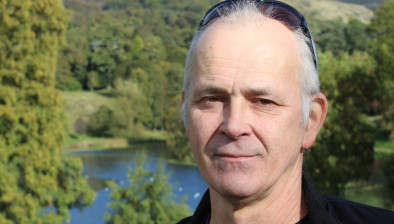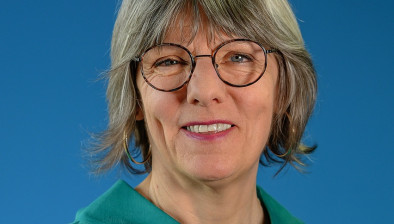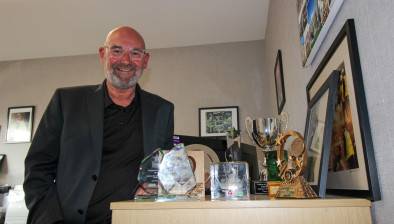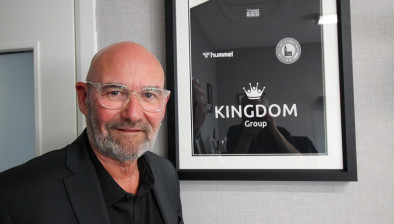Housing Champion: Lorna Cameron

Lorna Cameron
SHN’s Housing Champions feature returns with Lorna Cameron, chief executive of Horizon Housing, who speaks to Margaret Taylor about the inextricable link between accessible housing and social care.
It is almost 35 years since Lorna Cameron started her career at what was Strathclyde Regional Council, taking on a research role in the authority’s social work department. A move into a wider role in planning and research at Glasgow City Council then North Ayrshire Council followed before she served as head of housing and strategic commissioning at Perth and Kinross and chief housing officer at Stirling.
Now, having made the move to Horizon Housing, where she is chief executive, five years ago, she is pulling all the threads together, challenging the sector to come up with ways of ensuring the homes it offers are accessible to all.
“There’s a chronic shortage of accessible housing in Scotland,” Cameron says. “There are too many people living in unsuitable accommodation and there will be far more in the future. With our ageing population, we need to be facing up to this fact, as we don’t have a grand plan to be able to cope with people’s changing needs. About three in four of us will require social care as we age – to different degrees – and that’s worrying because there’s already significant pressures in the system.”
In an attempt to come up with new solutions Horizon, along with Scottish Housing News, is hosting a Housing & Social Care Accessibility Summit in Dundee’s V&A Museum in September. Housing minister Paul McLennan will open the event, which will bring together representatives from across the housing, social care, health, construction and design sectors as well as people with lived experience. The aim, Cameron says, is to highlight different perspectives as well as areas of best practice and to show what can be achieved when everyone works together.
“We’ll hear from tenants about what it’s like when their home isn’t accessible,” she says. “Some stories are about people living in a first-floor flat so can’t physically get out and others who can only access one part of their home – they can’t get into the kitchen so can’t have family meals or can’t access the garden. That’s not acceptable and is so detrimental to people’s health and wellbeing.
“We also want to talk about funding. We’re told [by central and local government] that they can’t afford to [build new homes or make adaptations] but we spent over a billion pounds in the last 10 years on delayed discharge – older people or disabled people end up in hospital but then they can’t be discharged because their homes aren’t suitable. That money would be far better spent at an earlier stage. There is money in the system but how do we spend it more wisely before reaching a crisis point? How can we think differently about the way the whole system is funded? That’s a challenge.
Rewarding excellence in accessibility
“We’ll also hear about some attractive and effective housing designs. This year we sponsored a new award – Excellence in Accessibility and Inclusion – at the Scottish Home Awards and we had some great entrants. The winner was Primrose Place in Alloa, a dementia-friendly development built by Campion Homes for Kingdon Housing. Campion, which is the headline sponsor for our Dundee summit, is a great example of a builder involved in developments that change lives for the better. We’ll hear about this and other great examples of where design has been good for everybody.
“We want to find out where the barriers are, how we can overcome them and what the possibilities are. Everyone is grappling with the same issues in a slightly different way. We want to bring people with different perspectives together to think differently to achieve a different outcome.”
Working across disciplines is nothing new for Cameron, who has been working collaboratively since her early Strathclyde Regional Council days, when she was responsible for gathering social work data and using it to work alongside planners to develop appropriate services for people to meet their needs.
“We wrote joint strategic plans for older people, disabled people, people with learning difficulties, people with dementia,” she says. “There was local and strategic joint working, looking at how people lived, where they lived. So much at that time was about the development of care and support for people in the community, moving them from inappropriate long-stay hospitals like Lennox Castle [an institution for people with learning disabilities that was based in Lennoxtown in East Dunbartonshire and closed down in 2002] into more stable home environments. This issue is still relevant today.
“We interviewed people living in Lennox Castle about their hopes and dreams and fears. Some were anxious about moving into a community but there was so much preparation before they moved and then support when they were there, to enjoy and participate in local activities and have a social life - the sorts of things we’d all want for ourselves. Unfortunately today there are still people living in accommodation a long way from home and in hospitals waiting for suitable accommodation and this isn’t acceptable.”
Part of the problem with finding suitable accommodation for people with accessibility and care needs is funding. Cameron makes the point that funding cuts over the past 12 years have been “devastating to public services, including to social care”. Recent cuts to the Scottish Government’s affordable housing budget, which was slashed from £752m in 2023-24 to £556m in the current year – a reduction of 26 per cent – will “have a real impact on people’s lives and their ability to live in suitable, accessible quality homes”.
It is for that reason, Cameron says, that key sectors must think differently about how it caters for the people it has a duty of care for and for disabled people needing an accessible home.
“The statutory services that were available have been severely cut or reduced, although many people are still getting really good services because of the excellent people who work here and the third sector and the fact they are really dedicated to what they are doing,” she says. “They still want to be able to make people’s lives better. Sometimes it’s just small changes that are needed and people are good at identifying barriers – it’s just about sitting down together to say ‘what can we do about this?’.
“We have to think differently about the way we work. People have much broader jobs now and part of that is good because it means we look at the whole person and where they live and the quality of people’s lives: how easily they can come in and out and move around their homes and enjoy family life.”
New Horizons
Cameron says she decided to move from the public sector into Horizon specifically because the housing association has such a strong focus on accessible and inclusive housing, ensuring tenants can live in the kind of homes that enable them to participate in society. The organisation has around 900 homes in total, spread out across 11 local authority areas. They are a mix of bungalows, flats and terraced houses and 25 per cent of them are wheelchair accessible. The key thing, Cameron says, is being able to adapt to tenants’ needs, something that was championed by her predecessor as CEO Julia Fitzpatrick, who passed away at the end of last year but is remembered for the work she did in normalising the use of statistical analysis for working out the housing needs of wheelchair users.
“Julia was very passionate about accessible homes, building more and making sure existing homes can be easily and quickly adapted as people’s needs change,” Cameron says.
“We’re learning over time what works with those homes and what we’d recommend for the future. There are different companies that design really attractive aids and adaptations so it’s not like people are living in an institution. It still needs to feel and look like a homely environment. That’s key for people’s general health and wellbeing.”
Cameron, whose spare time is spent travelling and enjoying her passion for classical music, wants to bring people together so those kind of features become the norm across the sector, with practical solutions to health and care needs delivered in a way that enables people to live life to the full. Ultimately, though, she says there is only one real solution if the crisis in accessible housing is to stand a chance of being averted.
“How would I fix things? I’d work with others to develop different funding structures to be able to build more accessible homes and have a far quicker process for people to be able to access adaptations in existing homes,” she says. “The vast majority of the population live in existing homes, with a smaller number of new homes being developed but we should have a focus on much more flexible designs for new homes and make it much easier to adapt existing homes.”
Tickets for the Housing & Social Care Accessibility Summit are available for £175 + booking fee via Eventbrite, or alternatively contact k.findlay@scottishnews.com to be invoiced for £145 + VAT directly from Scottish Housing News.
For more information, click here.
To read Dougie Herd’s thoughts on the importance of accessible housing and why Campion Homes is supporting the Housing & Social Care Accessibility Summit, click here.










